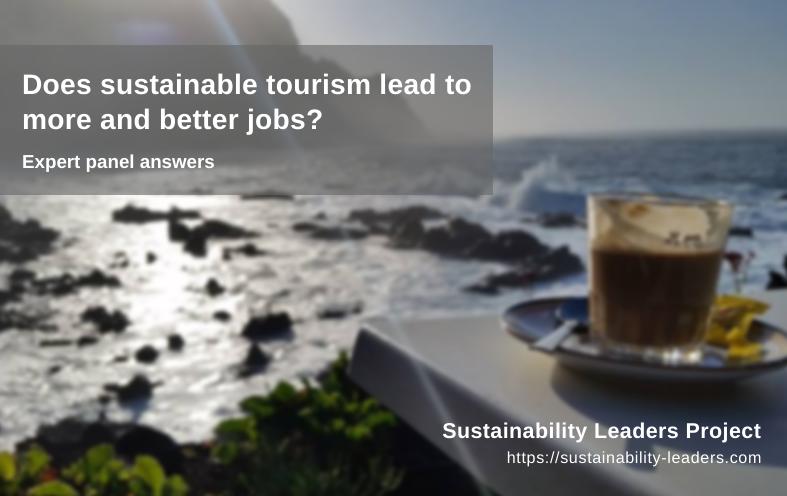Is sustainable tourism only about controlling mass tourism, devising strategies to reduce the carbon footprint and building eco-friendly businesses? Or is it more far-reaching than we might assume it to be? For example, does employing locals and giving them the responsibility to run the show have greater benefits in making tourism more sustainable?
We asked our panel of sustainable tourism specialists. Below the answers (highlighted respondents are available as consultants or speakers).
Our key takeaways:
- There is a notable relationship between sustainable tourism and jobs where the goal is to employ locals so that they can reap the benefits of visiting tourists.
- Businesses with strict adherence to sustainable travel practices ensure fair pay, equal opportunities to both genders, are socially inclusive, provide good working conditions, and career growth.
- DMOs must work towards providing appropriate training to the locals which is most suited to the local environment, instead of following a cookie-cutter approach.
- Governments and businesses in tourism shouldn’t hire locals as an eyewash, to attract conscious travellers. Rather, they need to ensure that the locals have a steady stream of income from tourism and have the opportunity and the right skills to move up the career ladder.
 Brian Mullis
Brian Mullis
Interview | Speaker profile
Guyana is one of the only countries in the world where tourism led by indigenous communities is the primary focus.
Community-led and owned tourism takes place when there is an interaction between an indigenous host community and a visitor. It leads to the sharing of an experience, product or service that has been created by a business or enterprise that is owned and operated by the community and which benefits the community as a whole.
Direct spending by domestic and international visitors leads to increased enterprise development and employment creation and has an economic multiplier effect within the beneficiary communities. Village entry fees and revenue from tourism enterprises can be allocated in community funds that are used to improve the tourism business, support educational programs, and community development projects selected by the community. Jobs include guiding, craft-making enterprises, food catering, transportation services, and management; cleaning, cooking, and reception roles within eco-lodges, as well as cultural performances and storytelling.
Dagmar Lund-Durlacher
Interview
Job-related aspects of sustainable tourism development are:
- Contracting a high number of local employees.
- Inclusion of socially deprived persons into the workforce. A great example: Lemon Tree Hotels (watch the videos on their unique inclusion initiative and how to provide equal opportunities).
- Gender issues (payment gap, discrimination)
- Responsible tourism businesses are more attractive to employees (higher application numbers, lower staff turnover).
- Sustainable human resource management includes fair salary, no discrimination, open communication, considering employees ‘voices’, creating an attractive working environment, education and incentive offers to employees (good examples: Best Alpine Wellness Hotels, Hotel Hochschober)
Gianna Moscardo
Interview
Jobs are often the main promise made to support proposed tourism developments. But many places find that this is often an empty promise. The bulk of the jobs provided are low skill, low pay, poor hours, poor working conditions and few benefits. It is also not uncommon to find that many of the jobs that are created are taken by people from outside the destination.
In some places, taking a tourism job means having fewer people to work on other family or household activities, such as farming, thereby creating a short-term gain for long-term net loss. I have been to many meetings in rural and peripheral regions where the local community, based on watching neighboring places take on tourism, decide they would rather have a mine or a high-security prison than tourism, because the jobs would be better.
So, to be sustainable, tourism must provide better jobs with more training and better conditions and support activities that help local residents develop the capacity to take these jobs. What would be even better is to have tourism that is based on local businesses and local collectives, so people have more than a job: a business or an enterprise with value beyond just employment.
I think governments, in all places, could do better in policy-making and planning for tourism if they explicitly took a sustainable livelihoods approach to think about what type of tourism development is most suited to local conditions.
Jonathan Tourtellot
Interview
Sustainable tourism should maximize the availability of jobs for local people and assist with building skills where needed.
 Jonathon Day
Jonathon Day
Interview | Speaker profile
It is amazing that – given the rationale for growth in tourism is often more jobs – there isn’t more research on what are the appropriate workforce development strategies for sustainable tourism. Too often in tourism, we focus on the numbers, without addressing the quality (this is true for visitor numbers, jobs, etc).
Most sets of sustainable tourism criteria include employing locals, good working conditions, support for inclusion and diversity, anti-exploitation measures, etc. – and as such they provide a good foundation.
But for tourism to really create the best outcomes for destination communities, effort must be made to ensure workforce development creates opportunities not only at the entry-level but through senior management and enterprise ownership.
Policies and procedures must ensure that tourism creates a pathway to success for folks wanting (or needing) to stay engaged in the industry through their careers.
My PhD student Poe Brodien is working in this area, looking at the intersection of workforce development and sustainable tourism. I am really excited to see where her studies will lead.
 Kelly Bricker
Kelly Bricker
Interview | Speaker profile
Tourism, and especially tourism that is focused on sustainability, can create employment opportunities at entry level – I think an important aspect of tourism is that one can be trained and can move up into managerial positions with experience.
The global trend is that 1 in 11 jobs are related to tourism industries, that is because of direct and indirect connections within the tourism system. If we hire locally, we are increasing the benefits to local communities, increasing opportunities at the destination level, and ensuring that the benefits recycle back into the local economy.
Masaru Takayama
Interview
Assuming every country makes an effort to achieve the SDGs through tourism, one of ten jobs or more jobs will be made available following the current trend of dynamic growth. People may not recognize themselves as a part of the tourism supply chain, like a rice farmer in a rural destination who supplies to a local hotel or restaurant. But a rise in demand for local produce through tourism growth will, in turn, lead to more employment opportunities.
Natalia Naranjo
Interview |
Sustainable tourism aims for a better quality of tourism activity, so it is supposed to guarantee fair salaries for better lives. There should be fair trade with suppliers, and if things are done well, the number of quality jobs must increase.
Peter Richards
Interview |
Working for a company with a concrete commitment to sustainability can significantly help increase staff motivation, reduce staff turnover, and contribute to longer institutional memory and optimized value and results from training.
Systematic Human Resource Development, decent pay, staff welfare, equal opportunities, safe workplaces, etc. are key elements of sustainability. Genuinely sustainable companies will be better and more attractive employers.
 Raj Gyawali
Raj Gyawali
Interview | Speaker profile
Tourism is all about jobs, and sustainability has to always have big impacts on people – hence jobs.
Some of the most pertinent issues to consider are the creation of more local jobs, increasing capacities, paying fairly and ensuring good, non-exploitative working conditions.
Vicky Smith
Interview | Speaker profile
The interest in sustainable tourism is undoubtedly growing, from policy to academia to practice. Courses have increased, and the number of graduates qualifying with it.
But even though sustainable tourism is now mainstreaming, we know the customer demand is latent, which hinders companies creating more roles and means the graduates might be qualified but they’re not necessarily experienced.
It can also possibly result in greenwashing – companies claiming more in PR than practice, either by not having qualified people in roles which ultimately make the product more responsible or by being proud of having the right people but not allowing them the scope to change the product and supply chain in the way required for sustainable tourism.
More qualified people than experience or roles means there’s a lot of competition for the jobs that do exist, many not able to secure jobs so set up as consultants (many without the experience really required) and it’s a buyers’ market – so the salaries offered are not commensurate with the knowledge involved.
My advice to those looking: you have to go above and beyond to stand out, so study and up-skill pro bono for the experience if required. Get experience in the mainstream market, to be able to gain the experience and apply the skills to sustainability. When consumer demand catches up, companies will begin to create more roles and value the knowledge and want people who have a commercial background too.
Vik Nair
Interview |
There is an important relation and connection between sustainable tourism and jobs. According to a recent United Nations Environment Programme (UNEP) report on tourism jobs, “The increase in the pace of environmental degradation has also increased the environment’s pace of coping with the damage”.
Sustainable tourism is the only way to reduce this impact. Hence, jobs in sustainable tourism will further grow in terms of quantity and quality.
As we move beyond the generation of the Millennials, who are labelled as a “generation guilty of self-entitlement and technology- addiction”, we failed to realise that this influential generation is also making waves and demanding sustainable change. They will be the generation that will be impacted by the failure of the past generation to act more sustainably. Hence, jobs that are promoting sustainable tourism will be the way forward.
At the university or college, most courses in sustainable tourism are particularly suited to students who are good communicators and organisers, and who have the capacity to deal with a multi-disciplinary approach to the natural world. The need for informed and articulate professionals to service this industry sector is growing rapidly.
Graduates today could find positions with tourism operators specialising in niche products that support sustainable and responsible tourism – such as eco-guides, planners, interpretative centre personnel, research officers, etc. These positions potentially lead to careers in sustainable tourism management.
Potential employers include tourist resorts and operators, government agencies at all levels, and non-government organisations. There is also great scope to start up small green businesses that support sustainability.
While local guides can provide valuable information about the local environment, there is an increasing demand for high-quality information, at various levels of sophistication, to be provided by people with a more global understanding of their discipline.
Willy Legrand
Interview
To borrow from a quote by the editors of The Travel & Tourism Competitiveness Report 2017, published by the World Economic Forum (WEF):
“The travel & tourism industry continues to make a real difference to the lives of millions of people by driving growth, creating jobs, reducing poverty and fostering development and tolerance” (Crotti & Misrahi, 2017, 3).
Now, while data is readily available on the economic impact of tourism as a whole (see Compendium of Tourism Statistics, UNWTO), quantifying the ‘sustainable tourism sector’ as a sub-section of the global tourism industry is difficult.
The Sustainable Development Goal (SDG) indicator 8.9.2 is a starting point, which looks at the “Proportion of jobs in sustainable industries out of total tourism jobs”. However, there are no agreed general statistical definitions of ‘sustainable tourism industries’. The same actually applies to ‘tourism jobs’.
As authors from the UNWTO Statistics and Tourism Satellite Account (TSA) state; “just because a ‘tourism job’ is in a ‘sustainable industry’ it doesn’t mean that the ‘tourism job’ itself would be sustainable” (Laimer and van der Pol, 2017, 3).
For instance, the UK measures the ‘number of people employed in tourism industries’, while Germany tracks the number ‘employed in accommodation’ sector. In both cases, a note indicates that the “actual indicator available [is the] closest to the corresponding global SDG indicator” (e.g. see here).
We are still a far cry from actually tracking employment data linked to sustainable tourism.
The United Nations World Tourism Organization (UNWTO), with the support of the United Nations Statistics Division (UNSD), launched a Statistical Framework for Measuring the Sustainability of Tourism (MST) a few years back. The initiative would cover 12 areas of policy implication for sustainable tourism, including section 3 on Employment. This is very much a work in progress.
Academics are often left looking at individual case studies (e.g. destination, region, business) in trying to understand and quantify the links between sustainable tourism and employment (number, quality, fairness).
More about the sustainable tourism expert panel here – including previous sessions and answers to some of the most pressing issues linked to making tourism more sustainable.
Do you want to ask the panel a question? Get in touch!
Buy Zyban
buy Valtrex
buy Fluoxetine without prescription
Buspar no prescription













